Vegetable Garden Restoring Livelihoods and Supplementing Nutrition of Tribal People in Covid-19 Pandemic
The livelihoods of rural and tribal population of Rayagada greatly affected due to the lockdown combating COVID-19 Pandemic. Their livelihoods primarily revolve around agricultural practices and daily labour works. Though the government has permitted for agriculture and MGNREGS works in later stage of lockdown, but getting agricultural input support was a challenge. Meantime, the MGNREGS works got affected due to monsoon break.
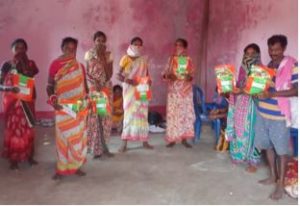 In order to give some respite to the poor tribals, the Child Development Project team of CYSD, in consultation with the community people, proposed to the Block and District Administration for promotion of individual vegetable cultivation projects, in the form of nutrition garden model, under MGNREGS. The District Administration had agreed with the proposal and advised Project Team to extend required support to the Kolnara Block Administration in mobilising the community. As per the proposed model, each beneficiary was suggested to get 34 man-days for land development and fencing of garden area measuring 1200 sqft.
In order to give some respite to the poor tribals, the Child Development Project team of CYSD, in consultation with the community people, proposed to the Block and District Administration for promotion of individual vegetable cultivation projects, in the form of nutrition garden model, under MGNREGS. The District Administration had agreed with the proposal and advised Project Team to extend required support to the Kolnara Block Administration in mobilising the community. As per the proposed model, each beneficiary was suggested to get 34 man-days for land development and fencing of garden area measuring 1200 sqft.
In order to carry forward the proposed Nutrition Garden project works, community meetings were conducted in each village of the outreach areas for collection of individual applications, making the job demand under MGNREGS and dissemination of input support. In this Khariff season, the Project could mobilise and able to technically support around 540 households under 5 panchayats of Kolnara block for the vegetable cultivation in Nutrition garden model and linked with MGNREGS for generating wages.
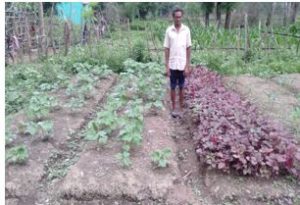 After completion of land preparation, getting required quantity of vegetable seeds was a big challenge. Whatever vegetable seeds was supplied by the Odisha Livelihoods Mission (OLM) to the beneficiaries, that was not adequate to cover the entire garden area. So, the Project Team approached to the Deputy Director of Horticulture, Rayagada to provision seeds for the left out beneficiaries. Considering the gamut of situation, the Deputy Director, Horticulture was agreed and supplied vegetables seeds in mini kit (13 varieties of vegetable seeds) for distribution to the remaining beneficiaries of the Project area.
After completion of land preparation, getting required quantity of vegetable seeds was a big challenge. Whatever vegetable seeds was supplied by the Odisha Livelihoods Mission (OLM) to the beneficiaries, that was not adequate to cover the entire garden area. So, the Project Team approached to the Deputy Director of Horticulture, Rayagada to provision seeds for the left out beneficiaries. Considering the gamut of situation, the Deputy Director, Horticulture was agreed and supplied vegetables seeds in mini kit (13 varieties of vegetable seeds) for distribution to the remaining beneficiaries of the Project area.
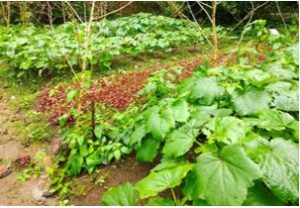 “Indeed, this agriculture input support ‘vegetable seeds’ is a great help for us to meet the vegetable requirements of our family as well as to fulfil the nutritional deficiencies and sell the surplus ones to procure allied household items”, says Suba Kantabansa, a successful vegetable grower from Gouda Lelibadi village. “We are really thankful to CYSD Team for restoring our livelihoods and supporting timely to get out of this pandemic burden”, added delighted Suba.
“Indeed, this agriculture input support ‘vegetable seeds’ is a great help for us to meet the vegetable requirements of our family as well as to fulfil the nutritional deficiencies and sell the surplus ones to procure allied household items”, says Suba Kantabansa, a successful vegetable grower from Gouda Lelibadi village. “We are really thankful to CYSD Team for restoring our livelihoods and supporting timely to get out of this pandemic burden”, added delighted Suba.
In the upcoming Ravi season, the Project has target of supporting 1000 households for vegetable cultivation under Nutrition Garden Model.

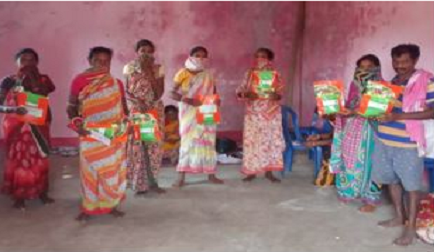

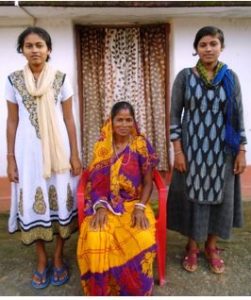 Being a farmer’s daughter, after her marriage Manju was observing that her father-in-law had been practicing broadcasting method in paddy cultivation. Out of 3 acres of land, production of paddy comes maximum up to 12 quintals per year. Manju, with confidence, insisted her father-in-law to change the existing traditional pattern of cultivation and to adopt line sowing for better yield and she committed to support in applying her advanced knowledge gained from the training imparted by CYSD in 1996. But Mahendra did not accept Manji’s advice. Rather, reluctantly allowed Manju and her husband Dhurba to start line sowing paddy cultivation in one acre of land on trial basis. Surprisingly, the result was very good – the production increased to 8 quintals from 4 quintals. Since then not only her family members accepted this innovative method of agriculture, but the entire villagers of Taramara adopted line sowing method after seeing the magical progress brought out by Manju.
Being a farmer’s daughter, after her marriage Manju was observing that her father-in-law had been practicing broadcasting method in paddy cultivation. Out of 3 acres of land, production of paddy comes maximum up to 12 quintals per year. Manju, with confidence, insisted her father-in-law to change the existing traditional pattern of cultivation and to adopt line sowing for better yield and she committed to support in applying her advanced knowledge gained from the training imparted by CYSD in 1996. But Mahendra did not accept Manji’s advice. Rather, reluctantly allowed Manju and her husband Dhurba to start line sowing paddy cultivation in one acre of land on trial basis. Surprisingly, the result was very good – the production increased to 8 quintals from 4 quintals. Since then not only her family members accepted this innovative method of agriculture, but the entire villagers of Taramara adopted line sowing method after seeing the magical progress brought out by Manju.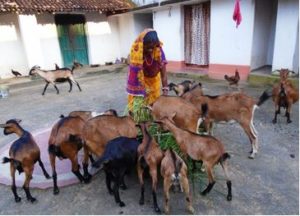 Educating her 3 daughters and giving one daughter’s marriage could only possible when Manju became an active member of Taramara Women’s SHG group promoted by the Child Development Project of CYSD. She was motivated to initiate a goat rearing project through availing a loan of Rs.5000 from the SHG. With the amount she procured 3 female goats in 2008 to start goat rearing in a small way and later received another she goat as gift from her father. With the proper care, she could increase the goat population up to 15 within 3 years’ time. Meantime, she has repaid the loan taken from the SHG. “We are living a happy life and the goat rearing is the real source of our happiness. We are getting food from agriculture, but meeting other household requirements from goat rearing. At the time of financial need, we needn’t have to borrow money from anybody, but we meet the requirement by selling a goat”, shared Manju delightfully while paying her thankfulness to CYSD team.
Educating her 3 daughters and giving one daughter’s marriage could only possible when Manju became an active member of Taramara Women’s SHG group promoted by the Child Development Project of CYSD. She was motivated to initiate a goat rearing project through availing a loan of Rs.5000 from the SHG. With the amount she procured 3 female goats in 2008 to start goat rearing in a small way and later received another she goat as gift from her father. With the proper care, she could increase the goat population up to 15 within 3 years’ time. Meantime, she has repaid the loan taken from the SHG. “We are living a happy life and the goat rearing is the real source of our happiness. We are getting food from agriculture, but meeting other household requirements from goat rearing. At the time of financial need, we needn’t have to borrow money from anybody, but we meet the requirement by selling a goat”, shared Manju delightfully while paying her thankfulness to CYSD team.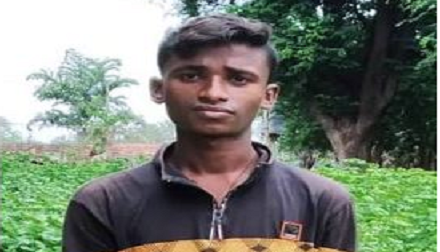
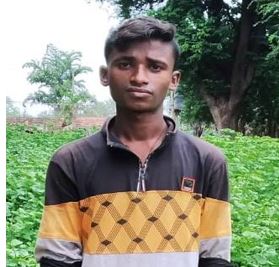 Korukonda block being the operational area of CYSD Child Development Project, this case came to the notice of its Program Team. A counselling team of the project encouraged Ratu to continue his study, but it was a bit difficult task for the team to persuade a small child for continuing his education who seemed quite disinterested to pursue his higher study. After continuous visit to his home accompanying a local community mobiliser, the project team counselled him including his parents and eventually Ratu backed to school in Class-VII.
Korukonda block being the operational area of CYSD Child Development Project, this case came to the notice of its Program Team. A counselling team of the project encouraged Ratu to continue his study, but it was a bit difficult task for the team to persuade a small child for continuing his education who seemed quite disinterested to pursue his higher study. After continuous visit to his home accompanying a local community mobiliser, the project team counselled him including his parents and eventually Ratu backed to school in Class-VII.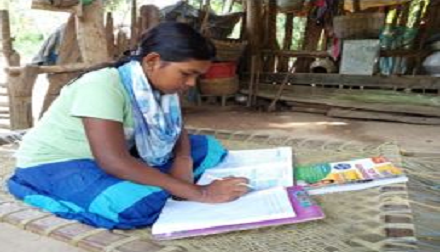
 Mencha, a 45 years old widow from Hatigoda tribal dominated remote village in Thakurmunda block of Mayurbhanj district took a great challenge in nurturing her 3 children – two daughters and one son, when her husband – Benudhar Gaipai passed away due to serious illness in 2017. That time, her elder daughter Anima was about to appear the High School Certificate Examination in two days ahead. Anima managed to complete her examination in First Division securing 63% marks and now continuing her higher study in Dharanidhar Maha Vidyalaya, Kendujhar. The second daughter, Pratima has been studying in Draupadi Girls’ High School, Nisaposi from 8th Std. with all sincerity and her participation in various programmes is remarkable.
Mencha, a 45 years old widow from Hatigoda tribal dominated remote village in Thakurmunda block of Mayurbhanj district took a great challenge in nurturing her 3 children – two daughters and one son, when her husband – Benudhar Gaipai passed away due to serious illness in 2017. That time, her elder daughter Anima was about to appear the High School Certificate Examination in two days ahead. Anima managed to complete her examination in First Division securing 63% marks and now continuing her higher study in Dharanidhar Maha Vidyalaya, Kendujhar. The second daughter, Pratima has been studying in Draupadi Girls’ High School, Nisaposi from 8th Std. with all sincerity and her participation in various programmes is remarkable.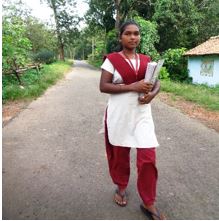 Being an Anganwadi Worker, Mencha manages a 4-member family with limited remuneration including children’s education. Knowing the value of education, she tries her level best to impart better higher education to her children. They have only a small homestead land of 0.30 Acre.
Being an Anganwadi Worker, Mencha manages a 4-member family with limited remuneration including children’s education. Knowing the value of education, she tries her level best to impart better higher education to her children. They have only a small homestead land of 0.30 Acre.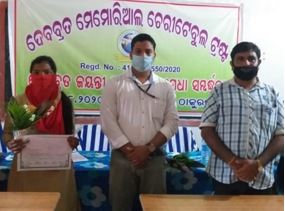 Being a sponsored child of CYSD’s Child Development Project since 2020, Pratima has been supported for her education in particular and Draupadi Girls’ High School, Nisaposi in general in terms of infrastructure, water facility, Computer lab, Library, study materials in every year, training, orientation & exposure to students & teachers. This helped Pratima a lot to perform well in her study. As a sponsor child, her family also availed varied support from CYSD including dry ration and hygiene kits during this Covid-19 pandemic.
Being a sponsored child of CYSD’s Child Development Project since 2020, Pratima has been supported for her education in particular and Draupadi Girls’ High School, Nisaposi in general in terms of infrastructure, water facility, Computer lab, Library, study materials in every year, training, orientation & exposure to students & teachers. This helped Pratima a lot to perform well in her study. As a sponsor child, her family also availed varied support from CYSD including dry ration and hygiene kits during this Covid-19 pandemic.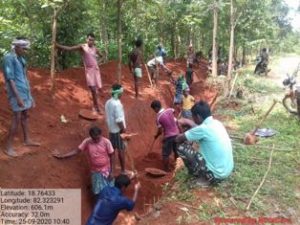 For last couple of years, after celebration of Duserha festival, these 19 labourers have been migrating to Gubeda in Andhra Pradesh for work in brick kilns. They used to earn approximately Rs. 9000 per month. Due to COVID-19 lockdown, they lost their job as the industry owner declared closure of the brick kiln and advised all the labourers to vacate the place quickly. Under the circumstances, they thought to come back to their native place, being the last option. In early May, they caught a truck as their transport for which they had to pay Rs. 500 each to the driver and finally reached at their native place. As per the government guidelines, they had to spend 14 days in quarantine centre set up at Mathapada High School nearby their villages.
For last couple of years, after celebration of Duserha festival, these 19 labourers have been migrating to Gubeda in Andhra Pradesh for work in brick kilns. They used to earn approximately Rs. 9000 per month. Due to COVID-19 lockdown, they lost their job as the industry owner declared closure of the brick kiln and advised all the labourers to vacate the place quickly. Under the circumstances, they thought to come back to their native place, being the last option. In early May, they caught a truck as their transport for which they had to pay Rs. 500 each to the driver and finally reached at their native place. As per the government guidelines, they had to spend 14 days in quarantine centre set up at Mathapada High School nearby their villages.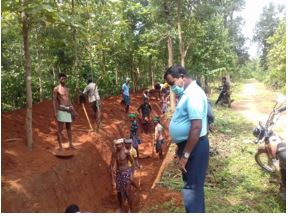 During the lockdown period, while in Goipadar village, without any job in hand the returnee migrants’ group exhausted whatever savings they had. Gradually, the miseries grew up in absence of food for the survival of their family members. Boipariguda block being the operational area of CYSD, this incidence caught the attention of its programme team. After continuous follow ups by the programme team, the migrants group got engaged in MGNREGA related work initiated by CYSD in partnership with UNDP in Mathapada gram panchayat of the Block which could help the migrants to earn for the survival needs of around 69 members.
During the lockdown period, while in Goipadar village, without any job in hand the returnee migrants’ group exhausted whatever savings they had. Gradually, the miseries grew up in absence of food for the survival of their family members. Boipariguda block being the operational area of CYSD, this incidence caught the attention of its programme team. After continuous follow ups by the programme team, the migrants group got engaged in MGNREGA related work initiated by CYSD in partnership with UNDP in Mathapada gram panchayat of the Block which could help the migrants to earn for the survival needs of around 69 members.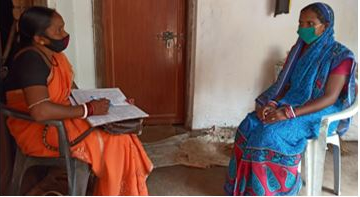
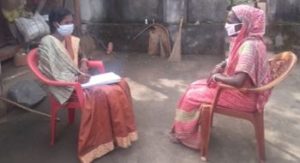 To take the process forward, a three-day virtual orientation programme (1st Sept. to 3rd Sept.) on psycho-social support (of 8 hours’ duration in total) was organized for 32 Community Resource Persons (CRPs) and the Programme Coordinators of RCRC Odisha partners, facilitated by Ms. Sushree Mishra, a Senior Counselor on psycho-social. After training, the CRPs involved in this project, as ambassadors of mental wellness, have visited different families and initiated conversation on mental health, impact of Covid-19 pandemic and people’s experience during this phase.
To take the process forward, a three-day virtual orientation programme (1st Sept. to 3rd Sept.) on psycho-social support (of 8 hours’ duration in total) was organized for 32 Community Resource Persons (CRPs) and the Programme Coordinators of RCRC Odisha partners, facilitated by Ms. Sushree Mishra, a Senior Counselor on psycho-social. After training, the CRPs involved in this project, as ambassadors of mental wellness, have visited different families and initiated conversation on mental health, impact of Covid-19 pandemic and people’s experience during this phase.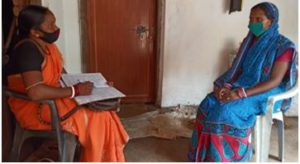 While talking about Covid-19 impacts, many stories, many struggles, Khirodini just shared a girl’s case who was reported attempting suicide simply due to the sheer difficulty in everyday life. She patiently listened and showed them a video (End your Problem, not Life) on the same issue. The same girl thanked Khirodini and promised her not to harm her life again.
While talking about Covid-19 impacts, many stories, many struggles, Khirodini just shared a girl’s case who was reported attempting suicide simply due to the sheer difficulty in everyday life. She patiently listened and showed them a video (End your Problem, not Life) on the same issue. The same girl thanked Khirodini and promised her not to harm her life again.